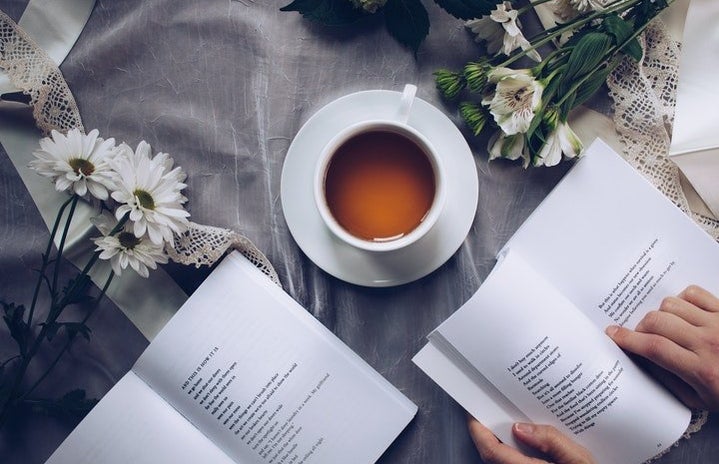Poetry—it isn’t everyone’s cup of tea.
Whether you were a legitimate fan of writing poems for English assignments in the past or consider classics like Shakespeare to be a total snooze, the art form has something for everyone. For one thing, there are many different types of poems. Among the best-known include haikus, sonnets, limericks, ballads, and even free verse. However, some of the least common are villanelles, sestinas, odes, and acrostics.
The word “poetry” derives from the ancient Greek term ποιεω (poieo), which means “I create” (1). Additionally, poetry may use either a condensed or compressed form to convey emotion or ideas to the reader’s or listener’s mind and ears—this can be accomplished by incorporating repetition, for example. An effective poem features the layering of imagery, word association, and musical qualities of the language used. But alas, this month is about celebrating whatever way your prose takes you, regardless of whether it’s a metrical masterpiece or a fantastic free verse.
In honor of April being National Poetry Month, Winona State Her Campus writers Hannah Hippensteel and Hailey Seipel wanted to take a moment to reflect on what poetry means to them, as well as provide one of their favorite poems they have written.

Hannah Hippensteel
What does poetry mean to you?
You’d be hard-pressed to find a birthday, Christmas, or other gift-giving event that didn’t result in me receiving another journal to add to my collection. And I’m so glad that’s the truth because for as long as I can remember, I’ve just loved opening up whatever notebook I’m ravenously going through and filling it with all my thoughts.
When I first started writing poetry, it was the standard rhyme schemes found in children’s books, because that’s what my voice was back then—childish. But as I’ve grown up and gone away from Dr. Seuss-ian stanzas, I’ve begun to love just letting my words flow with free verse poetry. I’m completely, utterly inspired by poets like Sabrina Benaim and Andrea Gibson. Their prose can range from biting language about a missed opportunity or the beauty that’s found from the mundane, ordinary activities that are brought to life through their love of language, of poetry (if you’re in the market for a great free verse read, check out Pansy by Gibson or Depression and Other Magic Tricks by Benaim-you won’t regret it). Their colloquial style of orating their poetry is also a breath of fresh air in the community because it allows you to connect with them on and off their pages of writing.
Poetry is definitely one of my favorite outlets because its meaning can transcend generations and language barriers; it’s ubiquitous. That’s what keeps me writing. Even though my poems are mostly kept in a bound journal, they are not bound to be kept to myself; they can have their own life outside my works in progress and maybe even be recognized as works of art.
I wrote this poem while messing with a format I hadn’t tried before, but soon grew to love as it provides a certain poetic challenge. Each last word in the sentence begins the next one, and I like that the poem lacks a finite ending because each word could bring you down a different avenue. Poetry is so fluid with its meanings, but I initially wrote this during a time in my life where I was struggling to speak out about my feelings; I kept getting in “sticky” situations that always left me questioning what my actual intentions with that person were in the first place. Life—sometimes it’s just a syrupy misunderstanding.
Syrupy
My thoughts are getting flossy and stretched,
Stretched too thin to hold you in them—cotton candy.
Candy hearts, that’s what we were,
Melting together in the heat of the summer,
Heat of the moment.
Momentarily, I forgot my pancakes on the stovetop;
They almost burned.
Burned by your words that bit me like an overheated griddle.
Griddle marks paired with puffy eyes from the tears that soothed.
Soothe, that’s what I had to do alone.
Alone, I had to sit and mend myself
Because you treated me like I didn’t matter suddenly.
Suddenly, but also so slowly, our tie to each other got less sweet.
Sweetheart, what happened to our conversations flowing so smoothly,
Like they were being poured from a bottle of maple syrup?
Syrupy, slurred speech from your efforts to redeem yourself,
And be cloyingly sweet.
Sweet surrender, I’ve come down with a cold.
Cold shoulder—you left me isolated,
Trying and failing to feign the role of an outsider,
Looking in my medicine cabinet but seeing that
The cough syrup had run out.
Out of excuses to make for myself,
Because I forgot to buy more, but you probably knew that right?
Right, because I will always choose to be stubborn
And muscle through a sore throat.
Throat filled with all my thoughts,
Thoughts that I can’t make
Pour out of my mouth like
Syrup.

Hailey Seipel
What does poetry mean to you?
I began writing poems at a pretty young age, initially for the simple enjoyment of being able to rhyme my own words. As I got older, though, I started to turn to poetry to help me either cope with feelings that I would otherwise brush off and push away from the surface (such as sadness) or explore concepts buzzing around in my mind that I did not quite understand (such as love).
One of the main reasons why I love writing poems is the mere fact that there is so much freedom for me, as the writer, to compose what exactly I want to say: rhyming can be deliberate or not present at all; punctuation can be used to aid in guiding the reader achieve the rhythm I formulated in my head or omitted altogether; the actual language used can be as formal or informal as I would like it to be. For me, writing poetry is effortless, the farthest thing from a task or a chore, and I know I can always rely on it to clear my mind and my heart.
In general, poetry gives me an escape route in which I can simultaneously lose and find myself, and in the following poem that I decided to share, I reflect on how falling in love with a particular person puts me outside of my comfort zone. Enjoy!
Call Me Fool
I look at the ground
When I walk.
Not because I want
To avoid eye
Contact;
Not because I am
Shy or feel
Insecure;
I look at the ground
When I walk
Because I am afraid
Of falling.
I am afraid of
Falling
On ice,
Of losing my
Balance
And looking like
A fool;
I am afraid of
Tripping
On a staircase,
Of messing up
My internal
Rhythm;
I am afraid of
Getting hurt,
Of the need to
Get back up.
And I was doing
Just fine
With looking
At the ground
Whenever I walked,
For I was not
A fool.
But then I heard
Your voice.
Maybe you said
My name;
Maybe all you did
Was laugh;
But when I heard
Your voice,
I looked up.
And guess what?
I fell.





